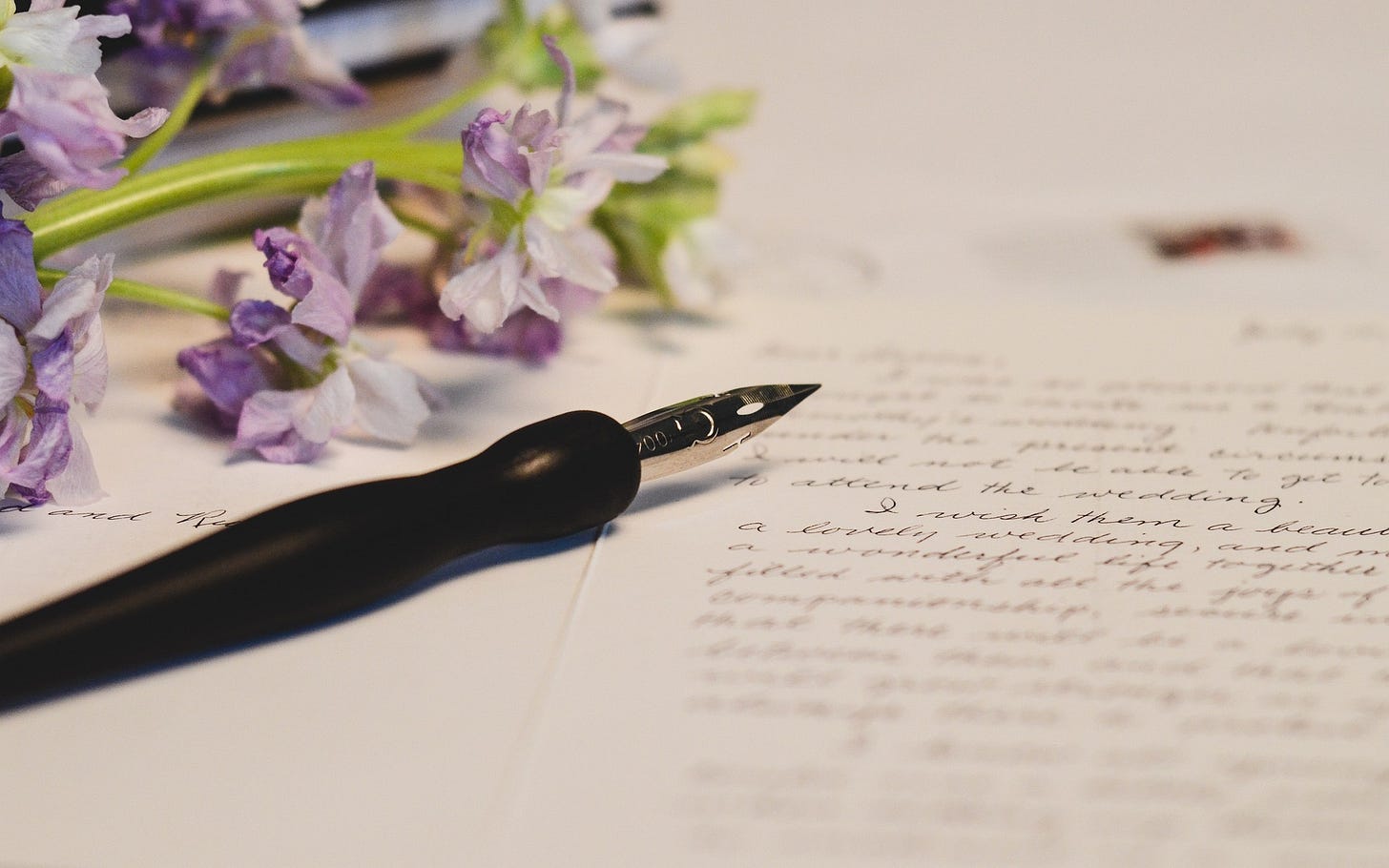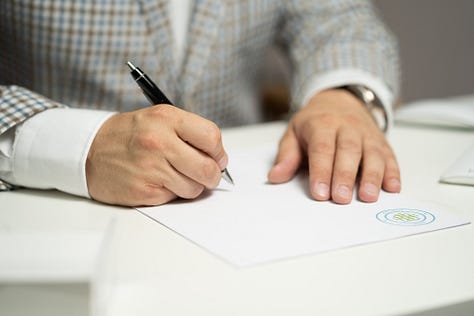#29 - Chinese Proverb: The Palest Ink Is Better Than the Best Memory.
Reflections on the power of writing rather than relying on memory.
Proverbs on Blast is a newsletter of reflection on PROVERBS and the gems they offer for personal and professional growth. Posts are written by a learner on a quest for more wisdom (me). Please keep reading. Comment at the end. Share this post. Subscribe for more.

The Chinese proverb, "The palest ink is better than the best memory," is a timeless reminder of the importance of documenting important information in writing. From ancient civilizations that used hieroglyphics to the modern-day digital age, writing has played a critical role in preserving and transmitting knowledge. In modern times, when technology has made it easier to store and retrieve information, the significance of this proverb is more relevant than ever before. What did the elders know about writing that they suggested it as a superior form of documentation compared to memory? And what is the symbolism behind the use of pale ink?
Writing is a more reliable form of documentation than memory because it is not subject to the distortions and inaccuracies that memory is prone to. Writing is also more accessible than memory because it can be easily retrieved and shared with others.
To Write or To Memorize?
The use of pale ink in the proverb is symbolic of the fragility of memory. In China, ink has a long history and cultural significance. The art of calligraphy is highly regarded and considered a form of expression and artistry. The contrast between pale ink and bright memory highlights the value of written records. Pale ink fades over time, just as memories fade with time. The use of pale ink also implies that even the faintest written record is more reliable than the brightest memory because of the significant challenges posed by the limitations of memory when it comes to preserving accurate information.
Memory is subjective, and people often remember things differently. Memory is also prone to distortion and can be influenced by a person's emotions and biases. The best human memory is capable of retaining information for an indefinite period of time. However, the ability to retrieve that information accurately decreases over time. Studies have shown that memory retention is affected by several factors, such as the complexity of the information, the level of interest or attention given to the information, and the individual's ability to recall the information. In general, people tend to remember information better if it is meaningful, relevant, and emotionally engaging.
Additionally, the use of mnemonic techniques such as visualization, repetition, and association can help improve memory retention. It is important to note that individual differences in memory capacity and retention exist, and that some people may have a better memory than others. In like manner, individual differences in memory function exists, and that some people may be more susceptible to memory impairment than others.
Several factors can impact memory and diminish accurate recall. Some of the most common factors are:
1. Time. Memory tends to decay over time, especially if the information is not reinforced or retrieved regularly.
2. Age. As people age, their memory abilities may decline due to biological changes in the brain.
3. Stress. High levels of stress can impair memory formation and retrieval.
4. Sleep/ Lack of sleep or poor-quality sleep can negatively affect memory consolidation, making it harder to remember information.
5. Health. Medical conditions such as Alzheimer's disease, stroke, or traumatic brain injury can affect memory.
6. Nutrition. Poor diet and vitamin deficiencies can negatively impact memory function.
7. Emotional state. Strong emotions, both positive and negative, can interfere with the ability to recall information.
8. Attention and focus. The ability to focus and pay attention to information is crucial for memory formation, and distractions or multitasking can impair these processes.
9. Encoding and retrieval strategies. The way information is encoded and retrieved can also affect memory. Effective encoding strategies, such as repetition or association, can improve memory, while ineffective retrieval strategies, such as cramming or guessing, can impair memory recall.
So, to write or to memorize?
In a society that values efficiency and organization, we cannot underestimate the importance of writing as a superior form of documentation compared to memory. Memory is fragile, and prone to lapses and diminishing returns. Writing is more reliable, accessible, and organized. The use of written records can ensure that information is not lost or distorted over time.
Written records have been instrumental in preserving history and culture. They provide insight into the customs, beliefs, and practices of previous generations. Written records also serve as a primary source of information for researchers, scholars, and historians. The availability of written records ensures that important information is not lost to time. They ensure a more organized and accessible form of information than memory. This is especially important in a society that values efficiency and organization.
This proverb underscores the importance of written communication in many fields, including business, education, and law. It is critical in education. The use of written assignments and exams ensures that students are tested on their knowledge rather than their memory. The proverb highlights the significance of written contracts and agreements, which provide a legal framework that protects parties and ensures that the terms of their agreements are clearly defined, preserved, and accessible for recall or enforcement.
Back to our question: to write or to memorize? As the Chinese proverb illustrates, “the palest ink is better than the best memory.” The wisdom of the words serves as a timeless reminder of the importance of written documentation. Take heed and write things down, whether as simple letters, emails, for educational purposes, or as legal agreements. Don’t rely on your memory. Just write.
There are several easy and fast ways to record information rather than relying on memory. Here are a few options:
Write it down. One of the simplest and most effective ways to record information is to write it down. This can be done with pen and paper, or by using digital note-taking tools such as Evernote, OneNote, or Google Keep. I use Evernote a lot. It started seven years ago when I responded to the company’s call to “Tame your work, organize your life. Remember everything and tackle any project with your notes, tasks, and schedule all in one place.”Their slogan is not just hype; they’ve been a lifesaver for me, and I have access to an organized documentation of years of my thoughts, complete with date and time stamps.
Record a voice memo. If writing is not an option, recording a voice memo on a smartphone or other recording device can be a quick and easy way to capture information. You can do this while on the move or busy with house chores. Check your phone for this feature or download a free app.
Use a dictation app. Many smartphones and computers come with built-in dictation software that allows you to speak your notes and have them transcribed into text.
Take a picture. If the information is visual, taking a picture with a smartphone or camera can be an easy way to capture and remember it.
Use a mind mapping tool. Mind mapping tools such as MindNode, XMind, or Coggle can help you visually organize and remember information.
Use a task management app. Task management apps such as Monday.com, Asana, or ClickUp can help you record and prioritize information related to tasks or projects. Here are some of the best Task Management Tools of 2023 to help keep you and your team organized and on target.
Use a journal. Keeping a journal can be a helpful way to record important information, thoughts, and ideas. Journaling offers additional mental, physical, emotional, and psychological benefits. Journals can be physical or digital and can be used for various purposes such as tracking habits, brainstorming, or reflection. If you are techy, here is a list of the 6 best journal apps for 2023. I like to write things down on paper, so I have bound journals where I capture different thoughts.
Handwriting or Digital Notetaking?
Now that we’re aligned with the wisdom of the elders that “the palest ink is better than the best memory,” how should you write? Technology gives us options, as you’ve seen if you clicked on any of the links in the previous section. However, if you’re not a techy person, here’s some good news. In a 2021 study by neuroscientists from the University of Tokyo, complete with functional MRI neuroimaging data and documentation, found that writing things down on paper is faster, more accurate, and allows you to be more creative. Perhaps the more fascinating find was that the process of writing by hand triggered increased robust activity in multiple areas of the brain and facilitated better memory recall in the participants in the Note group than the Tablet and Phone groups. They noticed the increase in “the language-related frontal regions, the visual cortices, the precuneus, and bilaterally in the hippocampus.”
Neuropsychologists talk a lot about “encoding,” the biological process by which what we perceive through our senses travels to our brain’s hippocampus, where they are then analyzed. It is the sorting space that leads to what gets stored in our long-term memory or discarded. The 2021 study in Tokyo confirmed what neuroscientists and neuropsychologists had stated previously, that—writing helps. Their findings also confirmed the free advice the Chinese elders gave through their proverb, that—writing helps. They said their piece before technology expanded the options of how to write and got us to where we now have to choose how to write.
So, what’s your excuse? There’s something out there today that will work for you, whether you’re techy or “old-school” like me. Just find a documentation method that works for you and use it. There’s been enough studies to settle the question of “to write or to memorize?” As technology advances and we continue to innovate with new gadgets to mimic functions like writing, there will be more studies about which writing forms—by hand or via digital devices—yield the greater benefit. Whatever answers we will uncover, start by acting on this free, timeless advice that “the palest ink is better than the best memory.”






AN APPEAL
Don’t waste your ideas or thoughts. Don’t fritter away your imagination. You may not have the means or the time to act on an idea when it comes to you. Don’t entrust it to your memory. Write it down.
Don’t bask in present euphoria when starting a business or project. Anticipate when the information you have at your fingertips now will wane. Contemplate when the high emotions of the people you’re with will cool and you all will need reminders about commitments, expectations, and roles. Write down a business plan. Get a legal agreement.
Something happened at work or in your family or life? Why not write it down to preserve it for posterity? Don’t trust your memory. Write it down. You will find the information useful later.
Memories fade and fail with time and we lose the material particulars of important ideas, events, and occurrences. Remember the wisdom of the Chinese elders: “the palest ink is better than the best memory.” What do you need to write down to preserve? Start writing.
LET’S TALK
Do you prefer the tactile experience of writing or do you find using a voice memo or dictation app as faster and more convenient? Share what recording method works best for you and your needs. We all could learn from you.
Perhaps you just want to click the “Like” button at this stage? That’s good too. You’ll find the button at the top and bottom sections of this post. Click away!
SUBSCRIBERS: A warm welcome to new subscribers and thank you to those of you who have been here for longer. I am grateful for being here and for believing in the vision that wisdom is profitable to direct, hence worthwhile to seek. Thank you for helping to advance the quest for wisdom. I appreciate you and look forward to your continued engagement.


Hand writing, the connection between the mind and hand. Write it down and watch it happen.
I write or type everything so I don't forget. Memories fade with age or mental conditions.